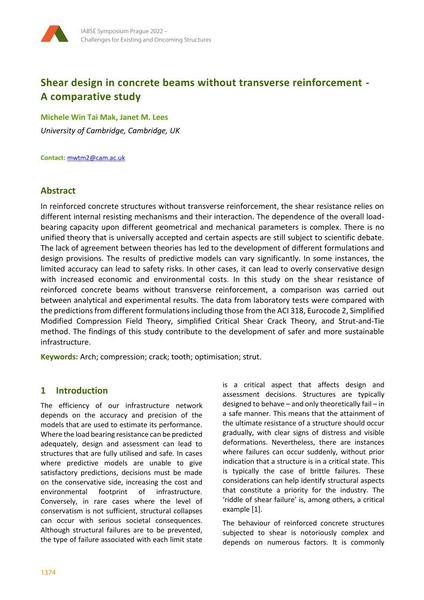Shear design in concrete beams without transverse reinforcement - A comparative study

|
|
|||||||||||
Bibliographic Details
| Author(s): |
Michele Win Tai Mak
(University of Cambridge, Cambridge, UK)
Janet M. Lees (University of Cambridge, Cambridge, UK) |
||||
|---|---|---|---|---|---|
| Medium: | conference paper | ||||
| Language(s): | English | ||||
| Conference: | IABSE Symposium: Challenges for Existing and Oncoming Structures, Prague, Czech Republic, 25-27 May 2022 | ||||
| Published in: | IABSE Symposium Prague 2022 | ||||
|
|||||
| Page(s): | 1374-1381 | ||||
| Total no. of pages: | 8 | ||||
| DOI: | 10.2749/prague.2022.1374 | ||||
| Abstract: |
In reinforced concrete structures without transverse reinforcement, the shear resistance relies on different internal resisting mechanisms and their interaction. The dependence of the overall load- bearing capacity upon different geometrical and mechanical parameters is complex. There is no unified theory that is universally accepted and certain aspects are still subject to scientific debate. The lack of agreement between theories has led to the development of different formulations and design provisions. The results of predictive models can vary significantly. In some instances, the limited accuracy can lead to safety risks. In other cases, it can lead to overly conservative design with increased economic and environmental costs. In this study on the shear resistance of reinforced concrete beams without transverse reinforcement, a comparison was carried out between analytical and experimental results. The data from laboratory tests were compared with the predictions from different formulations including those from the ACI 318, Eurocode 2, Simplified Modified Compression Field Theory, simplified Critical Shear Crack Theory, and Strut-and-Tie method. The findings of this study contribute to the development of safer and more sustainable infrastructure. |
||||
| Keywords: |
crack strut compression optimisation arch tooth
|
||||
| Copyright: | © 2022 International Association for Bridge and Structural Engineering (IABSE) | ||||
| License: | This creative work is copyrighted material and may not be used without explicit approval by the author and/or copyright owner. |
||||
